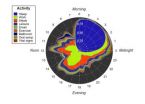(Press-News.org) CAMBRIDGE, Mass. (July 24, 2014) – For years, researchers and patients have hoped that embryonic stem cells (ESCs)—capable of forming nearly any cell type in the body—could provide insight into numerous diseases perhaps even be used to treat them. Yet progress has been hampered by the inability to transfer research and tools from mouse ESC studies to their human counterparts, in part because human ESCs are "primed" and slightly less plastic than the mouse cells.
Now Thorold Theunissen, Benjamin Powell, and Haoyi Wang, who are scientists in the lab of Whitehead Institute Founding Member Rudolf Jaenisch, have discovered how to manipulate and maintain human ESCs in a "naïve" or base pluripotent state similar to that of mouse ESCs without the use of any reprogramming factors. Their work is described in this week's issue of the journal Cell Stem Cell.
Naïve mouse ESCs are well-studied, and scientists have a strong understanding of how they function and mature into more specialized cells. But this understanding is of limited use in human ESC research, as the human cells look different, grow differently, and rely on different genes than mouse ESCs. According to Theunissen, the disparities between mouse and human ESCs are attributable not to species-specific differences but rather to differences of cell state.
In naïve mouse ESCs, a particular enhancer of the gene OCT4 is active, prompting the researchers to look for the presence of this marker as a means to identify rare naïve human ESCs. With this unbiased reporter system in hand, the Jaenisch team determined that a cocktail of five small molecules with a few additional growth factors can induce and support the conversion of primed human ESCs to a naïve state with or without using reprogramming factors to jumpstart the process.
By applying this cocktail to human blastocysts, the scientists could also isolate naïve human stem cells.
"This is important because if this cocktail only works in existing lines of human ESCs, you might wonder, does this really capture a distinct state or is this artificial?" says Theunissen. "Since the cocktail works directly on human blastocysts, I think it suggests that we're really capturing a cell state that is already present in the early human embryo."
Although other labs have recently reported creating naïve human ESCs, Theunissen, Powell, and Wang question these results as the cells produced through these techniques lack the gene expression and epigenetic profiles of naïve human ESCs. Yet, the Jaenisch lab believes they have now finally unlocked a way to create and maintain this important type of cell and are looking forward to exploring its potential.
"We have discovered a new pathway to generate something we believe is a totally different state of pluripotency in human ESCs that is very close to the mouse naïve state," says Jaenisch, who is also a professor of biology at MIT. "These cells may be essential for ESC technology, and that is an area we're looking forward to investigating. Now the big question for us is, does this state exist in vivo in embryos? Right now, we don't know, and that is a very interesting line of research."
INFORMATION:
This work is supported by the Simons Foundation (SFLIFE #286977), the National Institutes of Health (NIH; grant RO1-CA084198), a Sir Henry Wellcome Postdoctoral Fellowship, a Boehringer Ingelheim Fonds PhD Fellowship, and a Jerome and Florence Brill Graduate Student Fellowship. Jaenisch is co-founder of Fate Therapeutics and an adviser to Stemgent.
Rudolf Jaenisch's primary affiliation is with Whitehead Institute for Biomedical Research, where his laboratory is located and all his research is conducted. He is also a professor of biology at Massachusetts Institute of Technology.
Full Citation:
"Systematic Identification of Culture Conditions for Induction and Maintenance of Naive Human Pluripotency"
Cell Stem Cell, July 24, 2014.
Thorold W. Theunissen (1,*), Benjamin E. Powell (1,*), Haoyi Wang (1,*), Maya Mitalipova (1), Dina A. Faddah (1,2), Jessica Reddy (1,2), Zi Peng Fan (1,3), Dorothea Maetzel (1), Kibibi Ganz (1), Linyu Shi (1), Tenzin Lungjangwa (1), Sumeth Imsoonthornruksa (1), Yonatan Stelzer (1), Sudharshan Rangarajan (1), Ana D'Alessio (1), Jianming Zhang (4), Qing Gao (1), Meelad M. Dawlaty (1), Richard A. Young (1,2), Nathanael S. Gray (4), and Rudolf Jaenisch (1,2).
1. Whitehead Institute for Biomedical Research, Cambridge, MA, 02142, USA
2. Department of Biology, Massachusetts Institute of Technology, Cambridge, MA, 02142, USA
3. Computational and Systems Biology Program, Massachusetts Institute of Technology, Cambridge, MA, 02139, USA
4. Department of Cancer Biology, Dana-Farber Cancer Institute, Harvard Medical School, Boston, MA 02115, USA
Whitehead Institute researchers create 'naïve' pluripotent human embryonic stem cells
2014-07-25
ELSE PRESS RELEASES FROM THIS DATE:
Scientists test nanoparticle 'alarm clock' to awaken immune systems put to sleep by cancer
2014-07-25
(Lebanon, NH, 7/25/14) — Researchers at Dartmouth-Hitchcock Norris Cotton Cancer Center are exploring ways to wake up the immune system so it recognizes and attacks invading cancer cells. Tumors protect themselves by tricking the immune system into accepting everything as normal, even while cancer cells are dividing and spreading.
One pioneering approach, discussed in a review article published this week in WIREs Nanomedicine and Nanobiotechnology, uses nanoparticles to jumpstart the body's ability to fight tumors. Nanoparticles are too small to imagine. One billion ...
Clearing cells to prevent cervical cancer
2014-07-25
Boston, MA – A study published online in the International Journal of Cancer earlier this month describes a novel approach to preventing cervical cancer based on findings showing successful reduction in the risk of cervical cancer after removal of a discrete population of cells in the cervix.
The findings come from a study that looked at squamocolumnar junction cells, or SCJ cells. These cells reside in the cervical canal and have been implicated as the origins of cervical cancer. A research team co-led by Christopher Crum, MD, director, Brigham and Women's Hospital ...
Manipulating key protein in the brain holds potential against obesity and diabetes
2014-07-25
DALLAS -- A protein that controls when genes are switched on or off plays a key role in specific areas of the brain to regulate metabolism, UT Southwestern Medical Center researchers have found.
The research potentially could lead to new therapies to treat obesity and diabetes, since the transcription factor involved – spliced X-box binding protein 1 (Xbp1s) – appears to influence the body's sensitivity to insulin and leptin signaling. Insulin and leptin are hormones central to the body's regulation of food intake and sugar disposal, and obesity and diabetes are conditions ...
Why do men prefer nice women?: Responsiveness and desire
2014-07-25
People's emotional reactions and desires in initial romantic encounters determine the fate of a potential relationship. Responsiveness may be one of those initial "sparks" necessary to fuel sexual desire and land a second date. However, it may not be a desirable trait for both men and women on a first date. Does responsiveness increase sexual desire in the other person? Do men perceive responsive women as more attractive, and does the same hold true for women's perceptions of men? A study published in Personality and Social Psychology Bulletin seeks to answer those questions. ...
ACR statement on cancer study regarding patient anxiety from CT lung cancer screening
2014-07-25
Anxiety regarding inconclusive cancer screening test results among some patients is real and is only natural. However, as evidenced by Gareen et al, published July 25 in Cancer, the incidence and effects of anxiety associated with false positive or other results of computed tomography (CT) lung cancer screening exams are far less than claimed by some in the medical community.
"Unsubstantiated claims of systemic and harmful patient anxiety should now be put to rest and not continue to delay implementation of CT lung cancer screening programs or Medicare coverage for these ...
Vanderbilt study examines bacteria's ability to fight obesity
2014-07-25
A probiotic that prevents obesity could be on the horizon. Bacteria that produce a therapeutic compound in the gut inhibit weight gain, insulin resistance and other adverse effects of a high-fat diet in mice, Vanderbilt University investigators have discovered.
"Of course it's hard to speculate from mouse to human," said senior investigator Sean Davies, Ph.D., assistant professor of Pharmacology. "But essentially, we've prevented most of the negative consequences of obesity in mice, even though they're eating a high-fat diet."
Regulatory issues must be addressed before ...
NSU researcher part of team studying ways to better predict intensity of hurricanes
2014-07-25
FORT LAUDERDALE-DAVIE, Fla. – They are something we take very seriously in Florida – hurricanes. The names roll off the tongue like a list of villains – Andrew, Charlie, Frances and Wilma.
In the past 25 years or so, experts have gradually been improving prediction of the course a storm may take. This is thanks to tremendous advancements in computer and satellite technology. While we still have the "cone of uncertainty" we've become familiar with watching television weather reports, today's models are more accurate than they used to be.
The one area, however, where ...
NASA maps Typhoon Matmo's Taiwan deluge
2014-07-25
When Typhoon Matmo crossed over the island nation of Taiwan it left tremendous amounts of rainfall in its wake. NASA used data from the TRMM satellite to calculate just how much rain fell over the nation.
The Tropical Rainfall Measuring Mission or TRMM satellite orbits the Earth and provides coverage over the tropics. TRMM is a satellite that is managed by both NASA and the Japan Aerospace Exploration Agency (JAXA) that acts as a "flying rain gauge in space," that can estimate how fast rain is falling within storms on Earth and how much rain has fallen.
On July 22, ...
Shift work linked to heightened risk of type 2 diabetes
2014-07-25
Shift work is linked to a heightened risk of developing type 2 diabetes, with the risk seemingly greatest among men and those working rotating shift patterns, indicates an analysis of the available evidence published online in Occupational & Environmental Medicine.
Previous research has suggested links between working shifts and a heightened risk of various health problems, including digestive disorders, certain cancers, and cardiovascular disease. But whether diabetes can be added to the list has not been clear.
The authors therefore trawled through scientific research ...
Smartphone experiment tracks whether our life story is written in our gut bacteria
2014-07-25
Life events such as visiting another country or contracting a disease cause a significant shift in the make-up of the gut microbiota – the community of bacteria living in the digestive system, according to research published in the open access journal Genome Biology.
Two participants used smartphone apps to collect information every day for a year in the study by scientists from MIT and Harvard. The authors think the method could be rolled out to studies of human-bacteria relationships with many more participants.
Our microbiota is the community of bacteria that share ...

